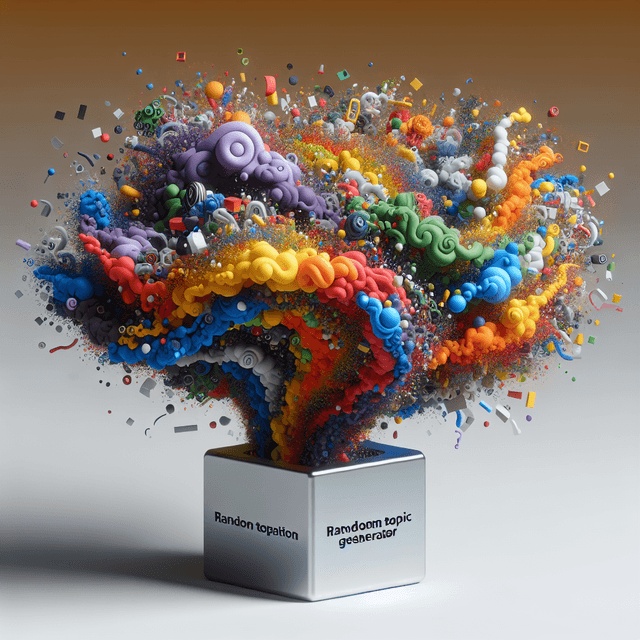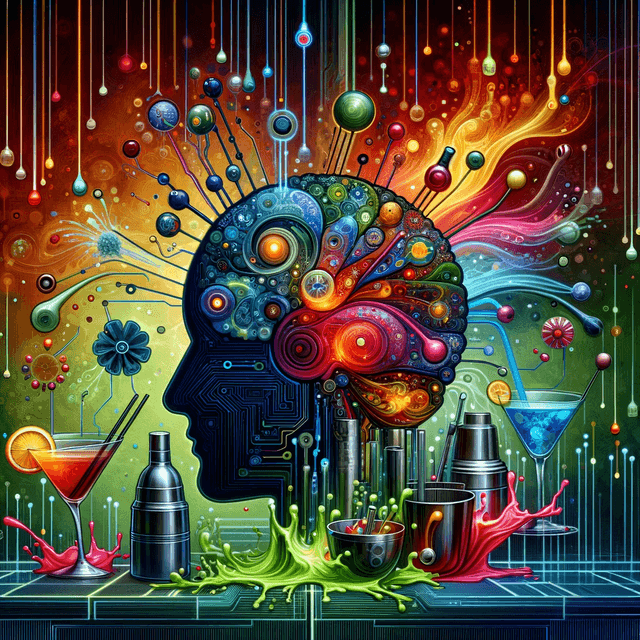
Rap Generator
Discover how AI-generated lyrics can enhance your songs and inspire new creative directions for your music.
Instructions
- Type your chosen theme or keywords into the input box to inform the AI of the desired direction for your rap lyrics.
- Press the “Generate” button to receive your AI-generated rap lyrics, then refine and experiment with the results as needed for personalized creation.
Try more AI writing tools
There's 112 to choose from.

Ship Name Generator
Create the perfect ship name for your favorite couples or characters. Get creative and unique name ideas instantly.

Emoji Inserter
Add 🎉 personality to your messages with the Emoji Inserter. Find the perfect 💬 emoji to express your 😊 emotions and enhance your 📲 communication.

Metaphor Maker
Transform your ideas into vivid metaphors that captivate your audience and enhance your writing.

AI Love Letter Generator
Express your deepest emotions with the help of our AI love letter generator.

Random Topic Generator
Generate endless inspiration with a random topic generator for all your creative projects.

Roast Comeback Generator
Unleash your inner comedian with tips on formulating the perfect roasts and comebacks. From timing to tone, master the art of quick wit effortlessly!

Poem Generator
Transform your words into powerful poetry with our AI poem generator. Express yourself in new and creative ways.

Song Lyric Generator
Embrace the future of music creation with our AI Song Lyric Generator, blurring the lines between human and machine creativity.

Rap Generator
Discover how AI-generated lyrics can enhance your songs and inspire new creative directions for your music.

Birthday Wish Generator
Inspire and uplift with age-appropriate birthday messages - Make your wishes impactful and heartfelt

Band Name Generator
Unleash your inner rockstar with our band name generator and find the perfect name for your band.

Drink Name Generator
Create catchy and exciting drink names with our AI-powered drink name generator.

Song Name Generator
Make your music stand out with a one-of-a-kind title generated by our AI song name generator.

Team Name Generator
Find the best team name for your sports team, club, or organization with our team name generator.

Baby Name Generator
Discover the perfect AI-generated baby name with our innovative AI baby name generator.
Mastering the Art of Rap Lyrics: A Creative Blueprint
Rap music has long been a platform for storytelling, activism, and personal expression. Its roots in the socio-economic struggles and triumphs of marginalized communities have given rise to a diverse and influential culture that transcends geographical and linguistic barriers. Writing good rap lyrics involves much more than rhyming words; it's about conveying emotions, sharing experiences, and connecting with listeners on a visceral level. This guide aims to equip you with the skills, techniques, and insights needed to write impactful rap lyrics that resonate.
Table of Contents
- Key Takeaways
- Finding Your Inspiration
- Understanding the Basics of Rap
- Crafting Your First Verse
- Mastering the Chorus
- Honing Your Flow and Delivery
- Rewriting and Refining Your Lyrics
- Overcoming Writer’s Block
- Finding Your Unique Voice
- Incorporating Storytelling and Narrative
- Ethical Considerations and Social Responsibility
- Recording and Sharing Your Music
Key Takeaways
-
Authenticity Matters: Genuine personal experiences and observations are foundational to writing compelling rap lyrics that resonate with listeners.
-
Structure and Themes: Understanding the basic structure of rap songs (verses, choruses, bridges) and exploring common themes adds depth and coherence to your music.
-
Crafting Verses and Choruses: Starting with a strong opening line, maintaining a consistent theme, and using literary devices can elevate your lyrics. A catchy, memorable chorus that ties back to your verses is essential.
-
Mastering Flow and Delivery: Rap is characterized by its rhythm and flow; practicing your delivery, experimenting with different styles, and improving breath control can enhance your performance.
-
The Importance of Editing: Rewriting and refining your lyrics is essential. Seek feedback and be open to criticism but also know when it's time to step back and recognize your work is ready to share.
-
Overcoming Writer’s Block: Recognizing the causes of writer’s block and employing strategies to overcome it can keep your creative process flowing.
-
Originality is Key: Drawing inspiration from others is part of the creative process, but finding your unique voice and style will make your rap stand out.
-
Storytelling Powers: Incorporating storytelling and narrative techniques into your rap can engage and captivate your audience, making your songs more impactful.
-
Ethical Responsibility: The messages conveyed through your lyrics can influence your audience. It's important to navigate controversial topics responsibly.
-
Recording and Sharing: Quality recording and effective sharing strategies are crucial for building an audience and establishing a presence in the rap community.
Rap is not just a genre of music; it's a vibrant form of expression that melds rhythm with poetry to tell compelling stories, challenge societal norms, and share deeply personal narratives. Whether you're a budding artist dreaming of your first cypher or a seasoned lyricist looking to refine your craft, writing good rap lyrics is an art form that requires creativity, dedication, and a profound understanding of the musical and lyrical elements that make rap so powerful. In this comprehensive guide, we'll walk you through every step of the process, from finding your unique voice to sharing your music with the world.
Finding Your Inspiration
Every great rap lyric begins with a spark of inspiration. For many artists, this inspiration comes from their own life experiences, observations, and reflections. The world around you is a rich tapestry of stories waiting to be told through your unique lens.
-
Sources of Inspiration: Personal experiences, whether joyous or painful, are a goldmine for authentic lyrics. Social issues, from systemic injustice to environmental concerns, can fuel powerful narrative-driven rap. Don't underestimate the impact of everyday observations and storytelling in crafting relatable and engaging lyrics.
-
Keeping a Lyric Journal: A lyric journal is an invaluable tool for capturing fleeting thoughts, interesting wordplays, and snippets of conversations. These jottings can later evolve into fully-fledged verses and choruses.
-
Listening to Varied Rap Music: Exposure to different styles, flows, and themes in rap can broaden your musical horizons and spark new ideas. Make it a habit to explore beyond your usual playlists to discover diverse influences.
Let's dive deeper into the essence of rap and uncover the building blocks of writing compelling lyrics.
Rap music, with its complex rhymes and rhythmic beats, presents a unique opportunity for artists to convey messages, share experiences, and express emotions in a way that resonates with a wide audience. Understanding the fundamental elements of rap is crucial for anyone looking to master the art of writing good rap lyrics.
Understanding the Basics of Rap
At its core, rap is about rhythm and poetry (R.A.P). It's a musical form that combines vocal delivery with rhyme, rhythm, and often a thematic complexity that transcends traditional songwriting.
-
Song Structure: Most rap songs follow a structure comprising verses, choruses, and sometimes a bridge. Verses are where the core of your message will lie, choruses serve to hook the listener and tie the song together, and bridges offer a break, adding depth and variation to the track.
-
Common Themes: Rap lyrics can cover a wide range of subjects – from personal triumphs and struggles to commentary on social and political issues. Authenticity in conveying your perspective on these themes is key to connecting with your audience.
-
Flow and Rhythm: The flow – or how you rhythmically deliver your lyrics over a beat – is as important as the words themselves. A great rap flow aligns with the beat in a way that enhances the overall message and feel of the song.
-
Rap Styles and Flows: There's a diversity of styles within rap, from the storytelling prowess of Kendrick Lamar to the melodic flows of Drake. Exploring different styles can help you find your own unique approach to rap.
Crafting Your First Verse
The first verse is your introduction, an opportunity to grab the listener's attention and set the tone for the rest of the song.
-
Starting Strong: Your opening line should be compelling, whether it’s a bold statement, a provocative question, or an intriguing story. The first few bars can make or break a listener's interest in your song.
-
Developing a Theme: Consistency in your theme helps keep your narrative coherent and engaging. Decide early what message you want to convey and weave it through your verses.
-
Rhyme and Scheme: A good rhyme scheme can add a rhythmic quality to your lyrics that enhances memorability. Experiment with internal rhymes, multisyllabic rhymes, and offbeat rhymes to add depth to your writing.
-
Literary Devices: Metaphors, similes, and alliteration can add layers of meaning to your lyrics. Clever use of literary devices can elevate your rap from basic to brilliant.
Mastering the Chorus
The chorus is the heartbeat of a rap song. It's what people remember, sing along to, and what often gets a song played on repeat.
-
Catchiness is Key: A great chorus is memorable and easy to sing along to. Think about rhythm, melody, and repetition when crafting your chorus.
-
Relevance to Verses: Your chorus should encapsulate the essence of your song. It acts as a summary of your message, tying together the themes explored in your verses.
Honing Your Flow and Delivery
Flow involves the rhythm and pace of your lyrical delivery, and it's what sets rap apart from other forms of musical expression. Mastery of flow allows you to play with the beat, creating a dynamic and engaging listening experience.
-
Practicing Flow: Listening to and mimicking the flows of established artists can be a helpful practice method. Pay attention to how they ride the beat, pause for emphasis, and use pitch and tone to convey emotion.
-
Breath Control: Good breath control is essential for delivering your lyrics clearly and with the desired impact. Practicing breath exercises can improve your stamina and delivery.
-
Experimentation: Don’t be afraid to experiment with different speeds, rhythms, and intonations. Rap is a versatile art form, and finding your unique delivery style is a journey worth taking.
Rewriting and Refining Your Lyrics
Editing is a crucial part of the writing process. Your first draft is just the beginning - revising and refining your lyrics can transform a good song into a great one.
-
The Editing Process: Approach your edits with a critical eye. Look for ways to tighten your flow, sharpen your wordplay, and clarify your message.
-
Feedback: Getting feedback from fellow artists, friends, or a trusted community can provide valuable insights into how your lyrics are received and areas for improvement.
-
Knowing When to Stop: While editing is important, it's also crucial to recognize when your song is ready to share. Perfectionism can hinder creativity, so trust your instincts.
Overcoming Writer’s Block
Writer's block is a common challenge, but it doesn't have to stifle your creativity.
- Causes and Strategies: Stress, perfectionism, and lack of inspiration can all lead to writer's block. Taking a break, changing your environment, and freestyling are just a few strategies that can help reignite your creative spark.
Finding Your Unique Voice
Originality is what sets great rappers apart from the rest. Your unique voice is your signature - it's how listeners recognize and connect with you.
-
Influences Without Imitation: Learning from those who inspire you is important, but finding your own path is what will make your rap stand out.
-
Signature Style: Whether it's through your lyrical topics, flow, delivery, or all three, developing a style that's uniquely yours is the ultimate goal.
Incorporating Storytelling and Narrative
Storytelling is one of the most powerful tools in rap. A well-crafted narrative can captivate listeners, provoke thought, and evoke strong emotions.
- Techniques: Use vivid imagery, compelling characters, and a strong narrative arc to bring your stories to life. Your rap can tell a complete story or offer a snapshot of a larger tale.
Ethical Considerations and Social Responsibility
Rap has the power to influence and inspire. With that power comes responsibility.
- Impact of Lyrics: Consider the messages your lyrics send and the potential impact on your listeners. Using your platform responsibly means navigating controversial topics with care and intention.
Recording and Sharing Your Music
Once you've honed your lyrics and flow, the next step is to share your work with the world.
-
Recording Basics: Investing in good quality recording equipment and learning the basics of sound engineering can significantly improve the quality of your tracks.
-
Sharing Your Music: Platforms like SoundCloud and Bandcamp offer great ways to share your music and build an audience. Engaging with your listeners through social media and live performances can also help you grow your fanbase.
In rap, as in any art form, there is no one-size-fits-all recipe for success. It takes time, practice, and a lot of experimentation to find your voice and perfect your craft. By staying true to yourself, seeking out new experiences and influences, and continuously refining your skills, you can create rap lyrics that not only sound good but resonate with people on a deeper level. Remember, the journey of a rapper is a marathon, not a sprint. Stay passionate, stay dedicated, and let your lyrics speak your truth.